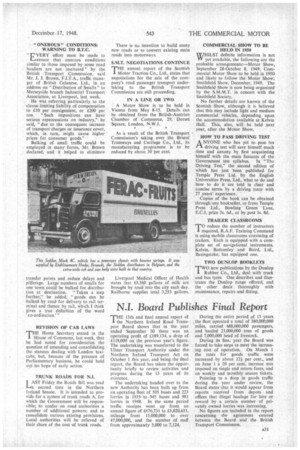N.I. Board Publishes Final Report
Page 33

If you've noticed an error in this article please click here to report it so we can fix it.
THE 13th and final annual report of I the Northern Ireland Road Transport Board shows that in the year ended September 30 there was an operating profit of £189,134, a drop of £118,000 on the previous year's figure. The undertaking was transferred to the Ulster Transport Authority under the Northern Ireland Transport Act on October I this year, and being the final report, the Board has taken the opportunity briefly to review activities and progress during the 13 years of its existence.
The undertaking handed over to the new Authority has been built up from an operating fleet of 505 buses and 223 lorries in 1935 to-945 buses and 981 lorries in 1948. In the same period traffic receipts went up from an annual figure of £676,731 to 13,820,633, mileage from 15,000,000 to over 47,000,000, and the number of staff from approximately 3,000 to 7,124. During the entire period of 13 years the fleet operated a total of 380,000,000 miles, carried 688,000,000 passengers, and hauled 23,000,000 tons of goods and 7,000,000 head of livestock.
During its finai year the Board was forced to take steps to meet the increasing cost of operation. On March 1 the rates for goods traffic were increased by about 124 per cent., and on June 1 a 20 per cent. increase was imposed on single and return fares, and on weekly and monthly season tickets.
Pointing to a drop in goods traffic during the year under review, the Board states that it would appear from reports received from depots and offices that illegal haulage for hire or reward by a certain number of privately owned lorries was increasing.
No figures are included in the report concerning the agreement entered between the Board and the British Transport Commission.




























































































